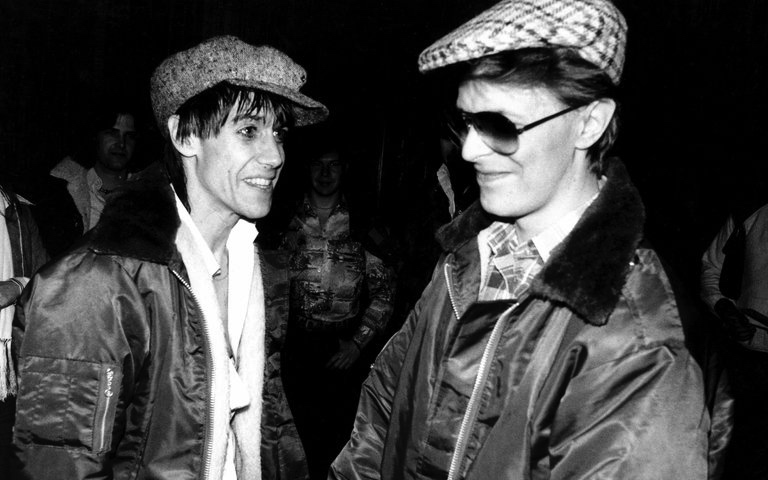After David Bowie died in January 2016, his occasional collaborator Iggy Pop recalled the superstar musician’s impact on his career. Iggy didn’t undersell Bowie’s importance.
“He resurrected me,” Pop told the New York Times. “He was more of a benefactor than a friend in a way most people think of friendship. He went a bit out of his way to bestow some good karma on me.”
Bowie had been doing that ever since he’d heard the Stooges’ first two records, impressed by the force of nature known as Iggy and his pals’ gritty drive and wild noise. At the height of Ziggy-mania, he helped the former Jim Osterberg kinda-sorta put the Detroit band back together and served as producer 1973’s Raw Power. But the Stooges imploded again, leaving Pop broke, drug-addicted and directionless. He checked himself into a mental institution.
While there Pop was paid a visit by Bowie, who then invited him on his 1976 tour. With both in the grip of drug addiction, they made a plan to move to Europe, get clean and make music at the same time. This marked the beginning of Bowie’s vaunted “Berlin Trilogy,” although the shift in musical style and tone actually began as the partners began working on what would become Iggy’s solo debut, The Idiot.
Pop and Bowie began sessions at Château d’Hérouville, just outside Paris, in the summer of 1976. Although they were staying in France, Iggy claimed that the two were inspired by “the idea of Berlin,” as well as the so-called krautrock of bands such as Neu! and Kraftwerk. In contrast to the garage rock of the Stooges, Pop and Bowie worked with drum machines, synthesizers and even toy instruments. It was very experimental – by Bowie’s design, according to Pop.
“I think I functioned as an outlet for his overflow. Because there are things he did with me that he couldn’t do as David Bowie, because it would have slowed him down or might have been a wrong move,” Pop told Uncut in 2006. “And then he was also able to use me to practice. … He made an Iggy album first, but watched the engineers there in the studio, learned how they worked, thought about it, had a chance to get to know the desk, and have daydreams about his own record while he worked on mine.”
So Pop saw The Idiot as a sort of test run/impetus for Bowie’s Low, which also began to take shape in France, then Germany in 1976. More than a decade later, the Thin White Duke confirmed Iggy’s take on the situation.
“Poor Jim, in a way, became a guinea pig for what I wanted to do with sound,” Bowie wrote in the Sound + Vision liner notes. “I didn’t have the material at the time, and I didn’t feel like writing at all. I felt much more like laying back and getting behind someone else’s work, so that album was opportune, creatively.”
Watch Iggy Pop and David Bowie Perform “Funtime”
Iggy would characterize his and Bowie’s working relationship in a few ways. One of them was that Bowie was like a film director. After all, he did encourage Pop to sing like Mae West on “Funtime.” Bowie would sometimes initiate a musical idea, a title, a concept and prod his collaborator to flesh out the idea. Pop later compared the relationship to My Fair Lady‘s Henry Higgins and Eliza Doolittle.
“He subsumed my personality, lyrically, on that first album,” Pop recalled, comparing it to having “Professor Higgins say to you, ‘Young man, please, you are from the Detroit area. I think you should write a song about mass production.’”
And “Mass Production,” with its finale of intertwined synthesizers, became The Idiot’s closing track. “Dum Dum Boys” came about when Bowie suggested that Iggy write lyrics about his former band. For “Nightclubbing,” Bowie told him to imagine he was “walking through the night like ghosts.”
But not all of the concepts came from David. Iggy developed “China Girl” after falling for the girlfriend of French singer-actor Jacques Higelin, who was recording at the same studio. One night, Pop confessed his passion to Kuelan Nguyen, who replied with “Shh…” The lyrics were paired with something Bowie and Pop had created on toy instruments.
By the time the duo moved from Paris to Munich to Berlin, they had the material, although Bowie’s producer Tony Visconti recalled having to do quite a bit of mixing to get Pop’s album ready for release. Inspired by Fyodor Dostoyevsky’s novel of the same name (a Bowie idea), The Idiot was released on March 18, 1977.
Even though The Idiot material predated the Low sessions, Bowie’s album was given precedence. It’s likely that the star wanted to debut the new “sound” with his own LP, not the one he had co-written and produced, but bore Pop’s name and picture on the sleeve.
Still, Bowie joined Pop’s band on keyboards to help promote The Idiot, which Iggy described as “a cross between James Brown and Kraftwerk.” Meanwhile, Pop and Bowie’s German expressionism would continue, as Bowie made two more LPs in the trilogy and the duo collaborated on Lust for Life, which came out only six months after The Idiot.
Even though Pop’s solo debut has been criticized for Bowie’s heavy hand, the record had a major influence on future new wave, alternative, gothic and electronic rockers – from Trent Reznor (who sampled the drum sound on “Nightclubbing”) to R.E.M., the Cars and Blondie (who all covered “Funtime”). But The Idiot also did well at the time, outperforming any and all of the Stooges records by hitting No. 30 in the U.K. and No. 72 in the U.S. It remained Iggy’s highest-charting album in his home country until 2016’s Post Pop Depression – which, appropriately enough, was partially inspired by The Idiot.

